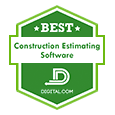Your company may have started small, with little to no infrastructure to support the successful scale of your business. However, as you begin to experience periods of rapid growth, you will encounter challenges impairing the profitability, visibility, and quality of your company's jobs. Software plays a major role in helping you navigate these tricky times with ease, efficiency, and effectiveness.
In the 2022 Construction Hiring & Business Outlook, the Associated General Contractors of America report that only 61% of contractors have formal plans in place for information technology to support business objectives. Through my experience in Customer Success Management here with UDA ConstructionOnline, I've worked with hundreds of growing firms around the world to implement construction management software successfully and have outlined for you below how to know if your company is ready for software:
1. You know what you need - and are able to quantify it (loosely).
You've asked the tough questions and come up with the even tougher answers, which is likely what has you thinking about software in the first place.
Did your company experience profit losses or gains last year?
Why aren't you closing more jobs?
Which type of jobs deliver the highest returns?
What's causing pervasive scheduling delays?
How can you empower your expanding team to do more?
With the answers to these and other analytical questions surrounding the current state of your construction company, you've successfully identified the problem(s) and are now seeking the solution(s).
2. You know that software is a tool - albeit a powerful, multi-purpose tool
You aren't expecting to turn your business around with a mouse click or three, but you are expecting to work your new tool, break it in, and make it a part of your every day processes. The right tool at the right time can make a tremendous impact on your business and your profits, but no house is built with a single saw.
3. You know what you are prepared to spend - and what you can get at your budget.
Construction management software platforms come in at all different price points, and you want to make sure you're focused on 3 things when assessing your options - capabilities needed, capabilities available, and associated costs. Companies that are ready for software have prepared for this endeavor by assessing their budget and identifying what they can invest in software financially.
> Pro Tip: Know the $ where you are most comfortable and also the $ that is your max. These should be two different figures and you should strive to stick to the "comfortable" range in between, so that the cost of the software isn't maxing your wallet out to the point that it becomes a cost burden, instead of a wise investment.
4. You know it's time for a change - and you're ready to compromise.
You're likely not shelling out hundreds of thousands of dollars - or months and months of time - to have a custom software built for your company, which means you'll be working with a system that takes a different approach to some of the things you've grown used to over time. If you're ready for software, it means you're open to the idea that there is a better way to do things than your current way - and you're ready to embrace these ideas.
An additional benefit of an already established software solution? It's been proven to successfully support companies like yours by millions of consumers worldwide, meaning it will work, if you will work with it.
5. You know how you would implement software at your company - and have developed an ideal timeline for said implementation.
My general recommendation is to look at the employees of your company and break the individuals down into categories - decision makers, evaluators, implementers, and users. Assessing your team members' strengths in this manner allows for you to determine who needs to be involved when, keeping the waters from being muddied with conflicting priorities. This is key to helping you outline your timeline from evaluation through implementation.
Unprepared companies often fall victim to declining profits, internal bloat, and diminished quality as demand and volume increase. To successfully scale your company, you will want to be equipped with the capabilities to persevere through these periods of rapid growth, and the right software can be key to your triumph. If you are ready for software, you're ready to invest the time, the money, and the effort in building a bigger, better business.


.png?width=230&name=uda_renew_logo%20(1).png)



